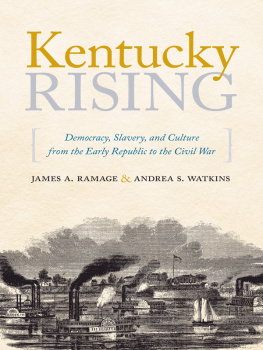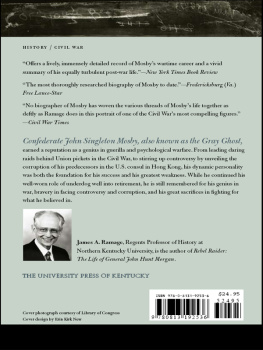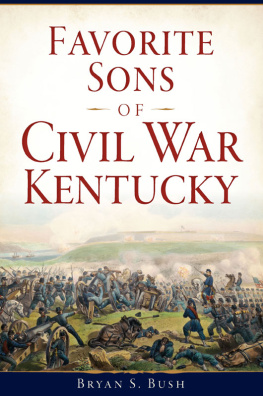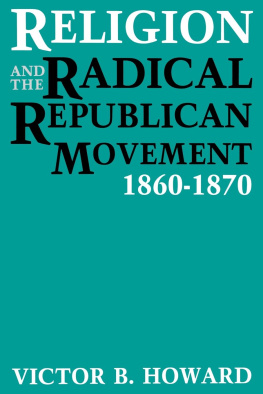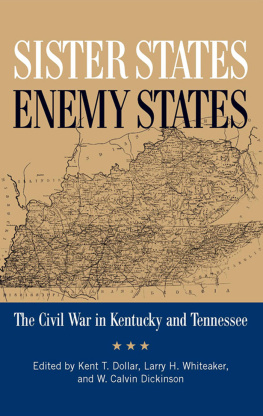KENTUCKY RISING
Democracy, Slavery, and Culture
from the Early Republic
to the Civil War
JAMES A. RAMAGE
AND ANDREA S. WATKINS
THE UNIVERSITY PRESS OF KENTUCKY
Published by The University Press of Kentucky
and The Kentucky Historical Society
Published by The University Press of Kentucky and The Kentucky Historical Society
Copyright 2011 by The University Press of Kentucky
Scholarly publisher for the Commonwealth,
serving Bellarmine University, Berea College, Centre College of Kentucky, Eastern Kentucky University, The Filson Historical Society, Georgetown College, Kentucky Historical Society, Kentucky State University, Morehead State University, Murray State University, Northern Kentucky University, Transylvania University, University of Kentucky, University of Louisville, and Western Kentucky University.
All rights reserved.
Editorial and Sales Offices: The University Press of Kentucky
663 South Limestone Street, Lexington, Kentucky 40508-4008
www.kentuckypress.com
15 14 13 12 11 5 4 3 2 1
Library of Congress Cataloging-in-Publication Data
This book is printed on acid-free paper meeting
the requirements of the American National Standard
for Permanence in Paper for Printed Library Materials.

Manufactured in the United States of America.
 | Member of the Association of
American University Presses |
To Rachel Watkins
Introduction
Parents in Kentucky and throughout the United States in the 1850s recommended Henry Clay as a role model for their young sons; they said that the great Kentucky statesman was an example of self-reliance, meaningful and unselfish public service, and success without formal schooling or powerful connections. He was Kentucky's brightest star, a world-famous hero and champion of liberty who, when he died on June 29, 1852, was the most popular man in America. Pastors recommended him as an ideal, self-sacrificing Christian husband and father who joined the Episcopal Church and began taking communion at the age of seventy. Clay's career and the national legend surrounding him symbolize one of the themes running through this studyKentucky had a relatively elevated status compared with the other states in the first half of the nineteenth century. We found evidence that Kentucky ranked near the top in respect among the states after the War of 1812 and that this prominence continued through 1860. Kentucky was an important center of higher education, and college students came into the state to study from fourteen states, including Virginia and others on the Atlantic coast; by 1840, Kentucky had ten colleges, more than Tennessee, Indiana, Illinois, or Missouri.
Another theme running throughout these years is that state governors and journalists in the eastern United States encouraged their citizens to emulate Kentuckians as the ideal models of patriotism and nationalistic military spirit. Beginning on the Indian frontier, Kentucky militiamen came to be known as the greatest warriors on the continent; when their reputation was transformed into legend, they were portrayed as great monsters, half alligator and half horse. When Kentuckians contributed to the victory against the larger, better-trained, and better-equipped Mexican army in the mountain pass at Buena Vista, in Kentucky they were compared to the three hundred Spartans who gave their lives for Greece in the narrow pass at Thermopylae in 480 B.C. The challenging side of these myths was that nearly every young man realized that, at the earliest opportunity, he was expected to reconfirm Kentucky tradition and charge into battle to gain honor for himself, his family, and the commonwealth.
When Kentucky selected two heroes for the national hall of honor in the U.S. Capitol, the two men chosen were both from the antebellum periodHenry Clay and Dr. Ephraim McDowell, recognized around the world as the father of surgery for performing the first ovariotomy in history. McDowell represents the accomplishments of Kentucky in medicine, science, and education. The doctors of the state, most of them educated in Lexington or Louisville, were well trained in the most up-to-date treatments, and some of the more outstanding were as successful with surgery as any physicians anywhere in the world. Science classes at Transylvania University included hands-on laboratory instruction and other teaching methods used in science classrooms today; Transylvania students had the latest journals, books, and laboratory equipment from Paris and London. Professor Constantine S. Rafinesque was a great science teacher who discovered healing drugs in Kentucky plants and was so far ahead of his time that today, even though many of his discoveries are used, others are yet to be fully explored. it was unusual for women to attend college classes, but Transylvania welcomed women as nonenrolled students in several science classes. By 1850, the people of Kentucky were taxing themselves to support one of the best public school systems in the South, and, in 1855, voters approved increasing the school tax from two to five cents per one hundred dollars of taxable property by a three-to-one vote, dramatic evidence of the people's belief in education.
Another theme that continues throughout the history of Kentucky from 1800 to 1865 is that Kentuckians were uniquely engaged in public affairs. It was phenomenal how the people used the power of democracy to express their will in mass public meetings of support or protest. When the century began, many Americans admired Kentuckians for their mass-protest meetings in 1798 against the Alien and Sedition Acts. Thomas Jefferson respected their effort so much that he selected the Kentucky legislature to enact his resolutions against the laws. Then Kentuckians gathered in public meetings again to celebrate the Louisiana Purchase, and, when Congress finally declared war on Great Britain in 1812, gatherings of the people had such violent anti-British feeling it was frightening. When Kentucky became a state, the first constitution had no property requirement to vote at a time when most states had such restrictions, and new settlers united with earlier residents in placing great value on electionsthey considered the right to vote the most sacred of rights. Frequently, the election turnout was over 70 percent of eligible voters; during election campaigns, large crowds attended mass rallies to shake hands with the candidates and hear their debates and stump speeches. Cassius Clay was correct when he said in 1841 that the eloquence of public speakers in Kentucky was unsurpassed in any other state. On December 22, 1849, when Henry Clay was feeling desperate to prevent the proposed Nashville convention from destroying the Union over slavery, he wrote from Washington to his friend Leslie Combs in Lexington requesting that Kentuckians rally in public meetings in support of the Union. Can't you get up a large, powerful meeting of both parties, if possible, at Lexington, at Louisville, &c.? he asked.
The strong belief in democracy was characteristic of American society, but the power of public meetings in Kentucky was extraordinary and had its dangerous side. In the debtor-relief controversy in 1824, stump speakers of the New Court Party, who were attempting to gain relief by destroying the independence of the judiciary, produced a legislature that agreed, and Kentucky almost had civil war. However, Old Court Party stump speakers awakened the gathered voters throughout the state to the danger, and they threw out the New Court Party legislators and elected Old Court Party members who respected property rights and the judges. Robert Breckinridge used the power of stump speaking to win voter approval of the first school tax; when slavery came under consideration in the election of delegates to the 1849 state constitutional convention, both antislavery and proslavery advocates spoke to local mass meetings. It was a tremendous debatethe most wide-ranging public debate on slavery in the slave states and probably in U.S. historyand, when the election came, the people of Kentucky were totally satisfied that the issue had been thoroughly considered. The result was a resounding defeat for gradual emancipationpopular votes against slavery totaled only about 9.7 percent of those voting.

